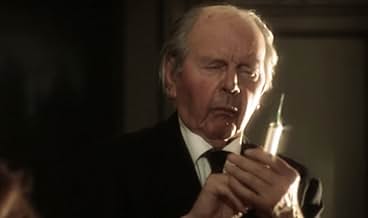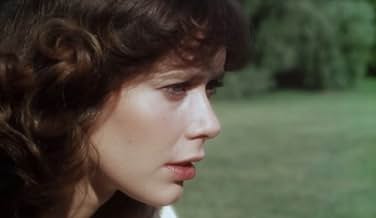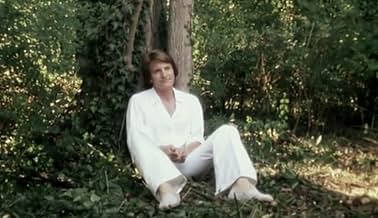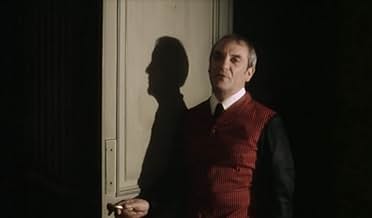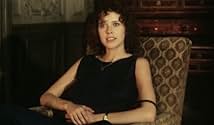Alice ou la dernière fugue
- 1977
- 1h 33min
CALIFICACIÓN DE IMDb
6.6/10
1.4 k
TU CALIFICACIÓN
Alice deja a su marido, el coche se avería y pasa la noche en la mansión. Al día siguiente, el coche funciona pero los propietarios desaparecen, ella se queda atrapada en la finca, cada vez ... Leer todoAlice deja a su marido, el coche se avería y pasa la noche en la mansión. Al día siguiente, el coche funciona pero los propietarios desaparecen, ella se queda atrapada en la finca, cada vez más preocupada por extraños descubrimientos.Alice deja a su marido, el coche se avería y pasa la noche en la mansión. Al día siguiente, el coche funciona pero los propietarios desaparecen, ella se queda atrapada en la finca, cada vez más preocupada por extraños descubrimientos.
- Dirección
- Guionistas
- Elenco
- Premios
- 1 nominación en total
Jean Le Boulbar
- Le Premier Homme
- (as Jean le Boulbar)
- Dirección
- Guionistas
- Todo el elenco y el equipo
- Producción, taquilla y más en IMDbPro
Opiniones destacadas
Surprising movie! A twist in the end! I like such movies, when the viewer is fooled ...when what we thought we understood is overturned! Reminds me of something from 'The Sixth Sense'. Do you agree? I didn't like the the acting of Silvia Kristel in a few sequences, as she seemed to be making some effort to speak. In the first shots with her husband, she acted strangely as she didn't seem distressed at all when announcing the latter that she would leave him. There was no visible stress on her face and she appeared relaxed when communicating her departure. The husband also acted strangely when he told her to stay one more night and to leave tomorrow morning! No one would have realistically said that! didn't like a few shots as well...For instance, some night shots in the beginning were not properly lit. But, it remains a movie with a great script, with minimal dialog, with each shot compelling us to ask...'what will happen next?'. The characters were all weird - and later we can deduce why...
I saw this movie on TV when I was 11 years old and it had a deep impression on me. Watching it again, I can identify many elements which are (and already were in the 1976) very conventional, or even outdated: the existentialist/ nouveau roman-plot, the Margritte-aesthetics, the "Psycho"-allusions...
The portrait of Alice (Kristel, sensuous as ever) and of her fate is sometimes of a certain merciless quality (misogynous tendencies?), but this movie is emulating the scenario of a real "cauchemare" far better than any other "Splatter" or "Horror"-Movie.
The portrait of Alice (Kristel, sensuous as ever) and of her fate is sometimes of a certain merciless quality (misogynous tendencies?), but this movie is emulating the scenario of a real "cauchemare" far better than any other "Splatter" or "Horror"-Movie.
Alice Carol (Sylvia Kristel) leaves her husband (Bernard Rousselet) in a rainy night telling that she does not like him anymore. She travels alone but when her car breaks the windshield in a lonely road, she crosses the gate of a creepy manor and is welcomed by the owner Henri Vergennes (Charles Vanel) and his butler Colas (Jean Carmet) that invite Alice to spend the night in the house. On the next morning, Alice does not meet the two men and finds the windshield of her car surprisingly fixed. She tries to leave the real estate but does not find the gate. She stops the car and walks around the wall trying to find an exit. Soon she finds that she is trapped and cannot leave the property.
"Alice ou la Dernière Fugue" is an intriguing unknown masterpiece written and directed by Claude Charbrol and supported basically by the wonderful performance of the gorgeous Sylvia Kristel. The story is developed in a nightmarish atmosphere and the name of the lead character "Alice Carol" seems to be a tribute to "Alice in the Wonderland" of Lewis Carroll. Further, Adrian Lyne's "Jacob's Ladder" is visibly inspired in the storyline of this film. The mystery is kept until the very last scene. My vote is nine.
Title (Brazil): "Alice"
Note: On 17 November 2024, I saw this film again.
"Alice ou la Dernière Fugue" is an intriguing unknown masterpiece written and directed by Claude Charbrol and supported basically by the wonderful performance of the gorgeous Sylvia Kristel. The story is developed in a nightmarish atmosphere and the name of the lead character "Alice Carol" seems to be a tribute to "Alice in the Wonderland" of Lewis Carroll. Further, Adrian Lyne's "Jacob's Ladder" is visibly inspired in the storyline of this film. The mystery is kept until the very last scene. My vote is nine.
Title (Brazil): "Alice"
Note: On 17 November 2024, I saw this film again.
The Disney cartoon is one of my favorite movies and while looking into other adaptations of the story I stumbled across this.
The beginning of the movie feels cliche and it drags a little. When she gets to Wonder/Horrorland the movie began to pull me in. The eerie infinite looping Mansion, with freaky characters and bizarre happenstances work well to build an unpredictable world that you alongside Alice get stuck in. Towards the end of the movie, keeping it spoiler free, Alice made a decision that I really don't understand. And the conclusion is something I had seen before in a Twilight Zone episode.
As an adaptation of Alice In Wonderland/Looking-Glass it's a flop. There is no Wonderland. None of the characters are there. The story is original. It's not complete non-sense. It's adult oriented. And aside from a couple of vague novel references it has nothing to do with Carrol's Story.
As a stand alone I think it's a hidden gem. With dozens of movie renditions, Alice doesn't always need to be true to the book. This movie has a great atmosphere, and in its own right a good sense of world building. Sure it's flawed and is clearly put together with time constraints and a low budget. But I do think it's worth checking out, and it's among the better horror movies that I have seen.
The beginning of the movie feels cliche and it drags a little. When she gets to Wonder/Horrorland the movie began to pull me in. The eerie infinite looping Mansion, with freaky characters and bizarre happenstances work well to build an unpredictable world that you alongside Alice get stuck in. Towards the end of the movie, keeping it spoiler free, Alice made a decision that I really don't understand. And the conclusion is something I had seen before in a Twilight Zone episode.
As an adaptation of Alice In Wonderland/Looking-Glass it's a flop. There is no Wonderland. None of the characters are there. The story is original. It's not complete non-sense. It's adult oriented. And aside from a couple of vague novel references it has nothing to do with Carrol's Story.
As a stand alone I think it's a hidden gem. With dozens of movie renditions, Alice doesn't always need to be true to the book. This movie has a great atmosphere, and in its own right a good sense of world building. Sure it's flawed and is clearly put together with time constraints and a low budget. But I do think it's worth checking out, and it's among the better horror movies that I have seen.
Though this was considered as something of an aberration in Chabrol's filmography and thus proved somewhat hard to find, for me it had always been the most intriguing entry from this ostensibly lean period (stretching from 1976 to 1984) in the director's career – being a unique foray for him into outright Surrealism and for which he obviously drew inspiration from "Alice In Wonderland" (even down to naming his heroine Alice Carol {sic}!).
Anyway, I was thoroughly absorbed in the dream-like 'events' – helped in no small measure by Jean Rabier's exquisite photography, a moody score by Pierre Jansen and, of course, the beguiling presence of stunning leading lady Sylvia Kristel (fitted throughout in a variety of simple but very elegant dresses). Given the latter's casting, star of the official "Emmanuelle" series of erotic movies, this clearly takes on an adult perspective – but, apart from one full-frontal nude scene and the barest hint of lesbianism towards the end, it is not otherwise explicit in this regard.
Incidentally, the original source has always been somehow refuted of its prepubescent associations; even so, it is telling that the film under review (featuring the likes of Charles Vanel, Jean Carmet, Chabrol's own young son Thomas, as well as Fernand Ledoux and Andre' Dussolier, both in dual roles for no very good reason except adding to the fun!) is, to me, a more rewarding viewing experience than the many versions of the Lewis Carroll classic I have come across. For the record, I am familiar with those made in 1933 (Paramount), 1951 (Walt Disney), 1966 (BBC-TV), 1972 (British) and 1988 (Jan Svankmajer) but still need to check out Tim Burton's latest adaptation, while also owning the pseudo-biopic DREAMCHILD (1985).
Chabrol may have been motivated towards making this following the release of the similarly oddball, even more fanciful but also rather muddled BLACK MOON (1975), made by his peer in the "Nouvelle Vague" movement Louis Malle. However, for all their illogical nature, the various episodes Alice finds herself a helpless and bewildered participant in – and which I have deliberately refrained from describing, since these have to be seen to be properly appreciated! – remain firmly grounded in reality (set as they are in a country-house, a gas station and a restaurant). The opening marital squabble and poignant closing shot, then, would seem to be evoking Jean-Luc Godard's CONTEMPT (1963), yet another of Chabrol's former colleagues! Indeed, an opening title reveals that ALICE is dedicated to the memory of the late Fritz Lang, one of Chabrol's idols and an actor (portraying himself no less!) in the latter film.
All of this creates a hauntingly oneiric feel which admirably approaches the contemporaneous work of my all-time favorite auteur, Luis Bunuel. The last act even introduces a DEAD OF NIGHT (1945)-like circular inevitability to the proceedings, while the final revelation of Alice's 'in limbo' predicament recalls, of all things, Jess Franco's A VIRGIN AMONG THE LIVING DEAD (1971; albeit one of his better efforts). In retrospect, it is regrettable that Chabrol did not go down this path more often in his career – and, while the film can be cherished as a one-off, it is also liable to get lost in the shuffle of his prolific oeuvre.
Anyway, I was thoroughly absorbed in the dream-like 'events' – helped in no small measure by Jean Rabier's exquisite photography, a moody score by Pierre Jansen and, of course, the beguiling presence of stunning leading lady Sylvia Kristel (fitted throughout in a variety of simple but very elegant dresses). Given the latter's casting, star of the official "Emmanuelle" series of erotic movies, this clearly takes on an adult perspective – but, apart from one full-frontal nude scene and the barest hint of lesbianism towards the end, it is not otherwise explicit in this regard.
Incidentally, the original source has always been somehow refuted of its prepubescent associations; even so, it is telling that the film under review (featuring the likes of Charles Vanel, Jean Carmet, Chabrol's own young son Thomas, as well as Fernand Ledoux and Andre' Dussolier, both in dual roles for no very good reason except adding to the fun!) is, to me, a more rewarding viewing experience than the many versions of the Lewis Carroll classic I have come across. For the record, I am familiar with those made in 1933 (Paramount), 1951 (Walt Disney), 1966 (BBC-TV), 1972 (British) and 1988 (Jan Svankmajer) but still need to check out Tim Burton's latest adaptation, while also owning the pseudo-biopic DREAMCHILD (1985).
Chabrol may have been motivated towards making this following the release of the similarly oddball, even more fanciful but also rather muddled BLACK MOON (1975), made by his peer in the "Nouvelle Vague" movement Louis Malle. However, for all their illogical nature, the various episodes Alice finds herself a helpless and bewildered participant in – and which I have deliberately refrained from describing, since these have to be seen to be properly appreciated! – remain firmly grounded in reality (set as they are in a country-house, a gas station and a restaurant). The opening marital squabble and poignant closing shot, then, would seem to be evoking Jean-Luc Godard's CONTEMPT (1963), yet another of Chabrol's former colleagues! Indeed, an opening title reveals that ALICE is dedicated to the memory of the late Fritz Lang, one of Chabrol's idols and an actor (portraying himself no less!) in the latter film.
All of this creates a hauntingly oneiric feel which admirably approaches the contemporaneous work of my all-time favorite auteur, Luis Bunuel. The last act even introduces a DEAD OF NIGHT (1945)-like circular inevitability to the proceedings, while the final revelation of Alice's 'in limbo' predicament recalls, of all things, Jess Franco's A VIRGIN AMONG THE LIVING DEAD (1971; albeit one of his better efforts). In retrospect, it is regrettable that Chabrol did not go down this path more often in his career – and, while the film can be cherished as a one-off, it is also liable to get lost in the shuffle of his prolific oeuvre.
¿Sabías que…?
- TriviaSylvia Kristel said in a 1981 interview that she feels this movie bombed because she only had one nude scene. She said "For some reason the roles in which I keep my clothes on never become successful movies."
- ConexionesFeatures Des chiffres et des lettres (1972)
- Bandas sonorasLe 24ème concerto en ut mineur
by Wolfgang Amadeus Mozart (as Mozart)
Performed on piano by Paul Von Schilhawski
Conducted by Rudolf Albert
Disque MUSIDISC.
Selecciones populares
Inicia sesión para calificar y agrega a la lista de videos para obtener recomendaciones personalizadas
- How long is Alice or The Last Escapade?Con tecnología de Alexa
Detalles
- Fecha de lanzamiento
- País de origen
- Idioma
- También se conoce como
- Alice or The Last Escapade
- Locaciones de filmación
- Chateau des Migneaux, Villennes sur Seine, Francia(Mansion of Henri Vergennes)
- Productoras
- Ver más créditos de la compañía en IMDbPro
- Tiempo de ejecución1 hora 33 minutos
- Mezcla de sonido
- Relación de aspecto
- 1.66 : 1
Contribuir a esta página
Sugiere una edición o agrega el contenido que falta

Principales brechas de datos
By what name was Alice ou la dernière fugue (1977) officially released in Canada in English?
Responda
